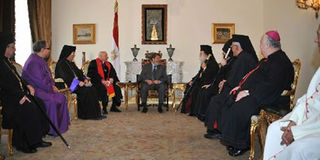Egypt to decide venue for Morsi oath

Egypt's president-elect Mohamed Morsi (centre) in a meeting with religious leaders from different denominations at the presidential palace in Cairo on June 27, 2012. Photo/AFP
Egypt was to decide Thursday the venue for Islamist Mohamed Morsi's swearing in as the nation's first civilian president, as Washington praised the military for facilitating a "free" poll.
Media reports said Morsi was consulting with a cross-section of Egyptian society ahead of appointing a prime minister and a cabinet that would largely comprise of technocrats.
Morsi's spokesman Yasser Ali told the official MENA news agency the venue for Saturday's swearing in ceremony would be decided on Thursday.
Traditionally the president takes the oath in Egypt's parliament but the country's top court has ordered the disbanding of the Islamist-dominated parliament.
The military subsequently assumed legislative powers and also formed a powerful national security council that is headed by the president but dominated by generals.
Egypt's private television CBC quoted one of the ruling generals, Mahmoud Hijazy, as saying that Morsi will be sworn before the constitutional court.
But by doing so Morsi would be acknowledging the court's decision to dissolve parliament.
The Muslim Brotherhood, which fielded Morsi as a candidate in the presidential polls, insists that the be taken before the parliament.
The Brotherhood has called for a huge demonstration on Friday at Cairo's iconic Tahrir Square under the slogan: "Day of the transfer of power."
"There is a debate around the issue of swearing in and attempts are being made to reach a compromise that will satisfy all national forces and a decision would be announced Thursday," MENA quoted Ali as saying.
Morsi, meanwhile, was "working on reaching some compromises on various issues so that all the parties are able to work together," his spokesman has also said.
Morsi, Egypt's first civilian president, and its first elected leader since an uprising ousted president Hosni Mubarak in February 2011, still has to contend with the Supreme Council of the Armed Forces.
The SCAF, which took control after Mubarak resigned, will retain broad powers even after it formally transfers control to Morsi at the end of June.
The military reserves the right to appoint a new constituent assembly should the one elected by parliament be disbanded by a court decision expected on September 1.
But the Brotherhood insists that only parliament can appoint the assembly.
Morsi, who quit the Brotherhood when he took the top job, has already met SCAF chief Field Marshal Hussein Tantawi, as well as a delegation from the Sunni body Al-Azhar, and another representing Egypt's Coptic church.
Support for Morsi, but huge challenges ahead
Morsi has, meanwhile, received supported from world powers, including the United States.
US Secretary of State Hillary Clinton congratulated him on Wednesday and also praised the military for facilitating the election.
"We have heard some very positive statements so far," Clinton said, noting Morsi's pledge to honour international obligations, "which would, in our view, cover the peace treaty with Israel," signed in 1979.
"We expect President Morsi to demonstrate a commitment to inclusivity that is manifested by representatives of the women of Egypt, of the Coptic Christian community, of the secular, non-religious community, and young people," Clinton added.
She lauded the Egyptian military, saying it "deserves praise for facilitating a free, fair and credible election."
Analysts, meanwhile, said Morsi will also face huge challenges as he tries to redress a battered economy which relies heavily on tourism -- a key revenue earner that took a beating during and after the revolution.
"The only way for Morsi to face up to the challenge is to seek help and surround himself with experts, outside of the Brotherhood," said Mona Ismail, a former head of the Arab Investment Bank.
The International Monetary Fund has already said it was ready to help Egypt tackle its "significant immediate economic challenges."
Since late last year the IMF has been discussing with the country's interim leadership a possible $3.2 billion loan to help Cairo bridge fiscal shortfalls while restructuring the economy and financial system.
Elsewhere a Cairo criminal court on Thursday jailed for 15 years each a former Mubarak-era cabinet minister and a businessman for selling Israel natural gas below market value, a judicial source said.
"The Cairo criminal court sentenced former oil minister Sameh Fahmi and fugitive businessman Hussein Salem to 15 years in prison each over the (Israel) gas deal," the source told AFP.




